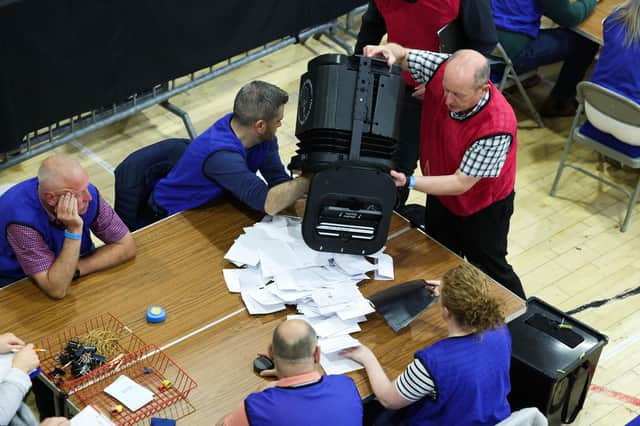Letter: A crisis in Protestant identity and faith is behind non voting in unionist areas


There has been considerable comment on the high numbers of non-voters, especially in unionist areas in the wake of the local council elections. The non-voting issue is a societal problem. I was taught by my parents to use my vote because it represented my freedom, my power to influence – a privilege purchased by the blood of our fellow country men and women who laid down their lives in the teeth of tyranny. Non-voting is more than a political issue, its an educational and a moral issue.
Politics in Northern Ireland abounds in diversity and choice despite our narrow geography; one certainly cannot claim a lack of choice is the problem. We all should be concerned by the numbers who completely disengage from the process, thinking that politics is not relevant. Now is the time for proper thinking on the part of society as a whole to work out a strategy to convince and educate our disengaged electorate that a vote is a truly precious and powerful commodity.
Advertisement
Hide AdAdvertisement
Hide AdThere is another, more fundamental issue, however, for the Protestant churches to face. The high numbers of non-voters in unionist areas arises also, I believe, from a crisis in faith and identity. Unionism historically has a strong history embedded in the Protestant reformed faith. Protestant and British identity in Northern Ireland cannot be isolated from the faith of our fathers. One can easily trace the role of faith in civic life from the first Scottish settlers, to the support for King William during the Williamite Wars, to the emergence of the Orange Order, unionist politics, the Home Rule Crisis and the creation of Northern Ireland, faith was central.


A decline in church identity in the traditional unionist heartlands has been matched by a similar decline in Protestant identity, which feeds into how one views society at large. Where nationalism has a tapestry of non-faith identity through the Irish language and the GAA the Protestant without faith has no real identity, no substantive reason for being.
Non-voting, however, isn’t the only manifestation of this identity crisis among unionists. The stubborn presence of the loyalist paramilitaries, who by their gangsterism in the name of an alleged ‘noble' cause hold communities in their grip, have been swallowed up by a lawless and empty ‘Protestantism’ – a cause devoid of morality and principle.
On the other hand the growth of secularism among unionism, where faith is seen as an embarrassment is a further sign of this growing identity crisis. At times it feels like we are a people clutching in the darkness struggling to know who we really are. Unionist Ulster is in danger of defeat not by Sinn Fein or the nationalist vote but by our own spiritual and moral apathy.
Advertisement
Hide AdAdvertisement
Hide AdThere is much work to be done to win the soul of Ulster; now is the time for the church to be energised by evangelistic zeal – our future depends on a return to the old paths.
Rev Peter McIntyre, Clogher Valley Free Presbyterian Church, Fivemiletown, Co Tyrone